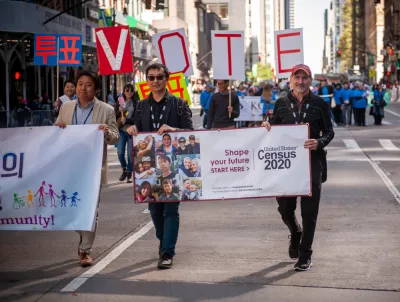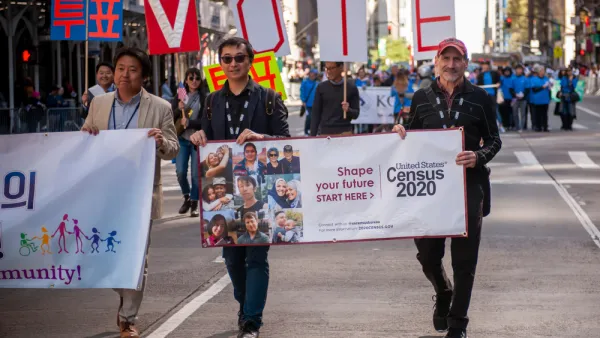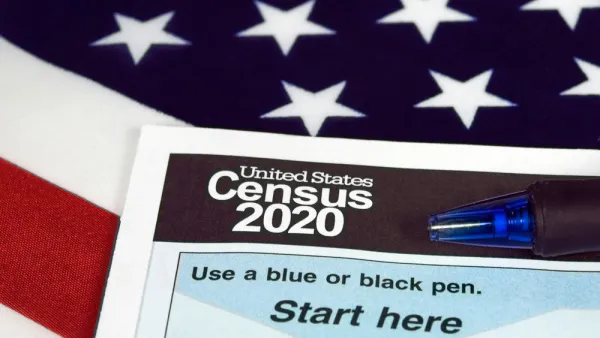There are a number of obstacles and issues related to the 2020 Census enumeration of apartment building residents. This set of FAQs covers “Census Information for Rental Property Owners.”

There are a number of obstacles and issues related to the 2020 Census enumeration of apartment building residents. This set of FAQs covers “Census Information for Rental Property Owners.”
Landlords and building managers need to know:
Why is the Census important?
Census data guide distribution of government resources, services and infrastructure investment. Every year, billions of dollars from the federal budget are distributed to communities — for education, transportation, housing and health — with amounts determined from population data.
How does the Census work? When does it happen?
By April 1, 2020, all residential addresses will receive 2020 Census materials in the mail. Residents should fill out their Census questionnaire as soon as possible, either online or by mail. Both forms of responses are accepted.
The 2020 Census is not something that households can ignore. Residents who do not respond to the first mailing will receive four additional mailings.
Starting in May, Census workers will begin calling on addresses that continue to have a “non-responding” status. These follow-up visits will take place through August 2020.
What if an occupied apartment or unit does not receive any Census materials?
Landlords and building managers can assist the 2020 Census by letting residents know that Census materials should arrive by April 1, 2020. If not, people can still complete the 2020 Census through a secure, online questionnaire at 2020census.gov.
Who needs to be counted in my apartment building?
Everyone counts — and the Census Bureau wants to count everyone at the right place. The general rule: People should report themselves living at their usual place of residence.
How can you verify that someone is a Census worker?
Landlords and building managers should always verify that Census workers have a photo ID badge. The badge will have the Census worker’s name, photograph, and a US Department of Commerce watermark.
If you still have questions, you can call the Census Bureau at 800-923-8282.
What might a Census worker ask of a landlord or building manager?
Mostly, Census workers will need to enter building hallways, knock on apartment doors, or buzz apartment call boxes. They will ask whether addresses on their lists were occupied or vacant on April 1, 2020.
Census workers may ask for residents’ names, phone numbers and usual hours at home. Landlords and building managers must cooperate and provide known information if Census workers ask.
If Census workers are unsuccessful communicating with residents, they may ask detailed questions about who lives in specific units, their names, relationships to one another, races and ages. The Census Bureau considers response by a landlord to be a last resort — but it is a valid request if contact with residents has failed.
Is answering the Census required?
Participation in the Census is required by federal law. Census workers are empowered by federal law to ask for any of the information listed on the Census questionnaire (13 U.S.C. § 221 and 223). They do not need a court order for this work.
Are there privacy issues to consider?
Providing information to Census workers is not a violation of anyone’s privacy rights. Federal law requires that landlords and building managers cooperate to the extent they are able.
Federal law also requires that landlords or building managers provide reasonable access to buildings. If a person refuses to cooperate, refuses access, or otherwise impedes a Census worker, the Census Bureau can take legal action. Refusing to provide information or impeding a Census worker is a federal offense that can lead to a fine of up to $500.
What do the Census Bureau and federal law consider to be reasonable access to buildings?
Landlords and building managers must allow Census workers to walk through hallways, knock on apartment doors, or buzz apartment call boxes. Census workers will need time and space to conduct interviews. Census workers may have to return multiple times to secure interviews. These repeat visits must be accommodated.
FULL STORY: HRA Owner/Landlord Information: Census Information for Rental Property Owners

Analysis: Cybertruck Fatality Rate Far Exceeds That of Ford Pinto
The Tesla Cybertruck was recalled seven times last year.

National Parks Layoffs Will Cause Communities to Lose Billions
Thousands of essential park workers were laid off this week, just before the busy spring break season.

Retro-silient?: America’s First “Eco-burb,” The Woodlands Turns 50
A master-planned community north of Houston offers lessons on green infrastructure and resilient design, but falls short of its founder’s lofty affordability and walkability goals.

Test News Post 1
This is a summary

Analysis: Cybertruck Fatality Rate Far Exceeds That of Ford Pinto
The Tesla Cybertruck was recalled seven times last year.

Test News Headline 46
Test for the image on the front page.
Urban Design for Planners 1: Software Tools
This six-course series explores essential urban design concepts using open source software and equips planners with the tools they need to participate fully in the urban design process.
Planning for Universal Design
Learn the tools for implementing Universal Design in planning regulations.
EMC Planning Group, Inc.
Planetizen
Planetizen
Mpact (formerly Rail~Volution)
Great Falls Development Authority, Inc.
HUDs Office of Policy Development and Research
NYU Wagner Graduate School of Public Service




























